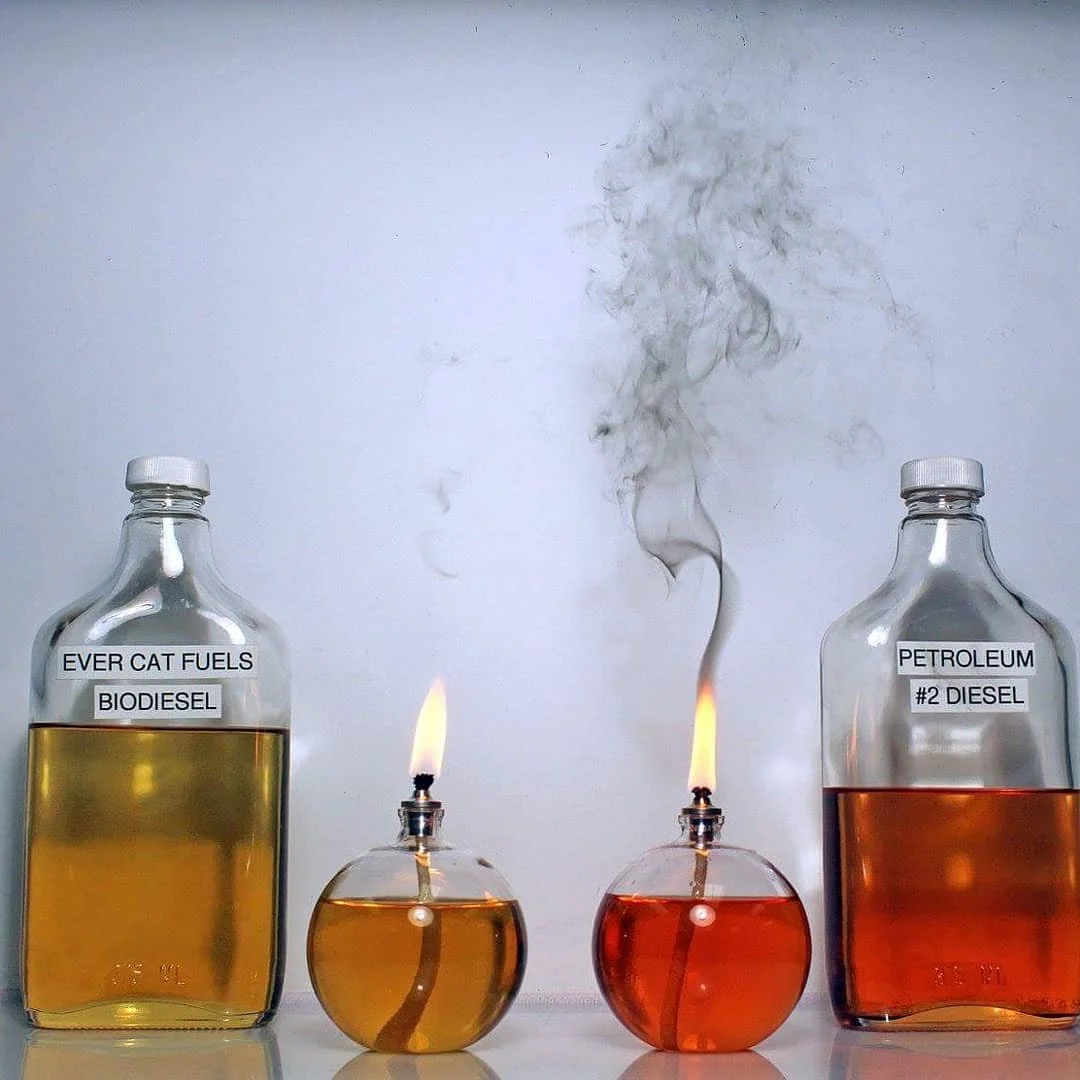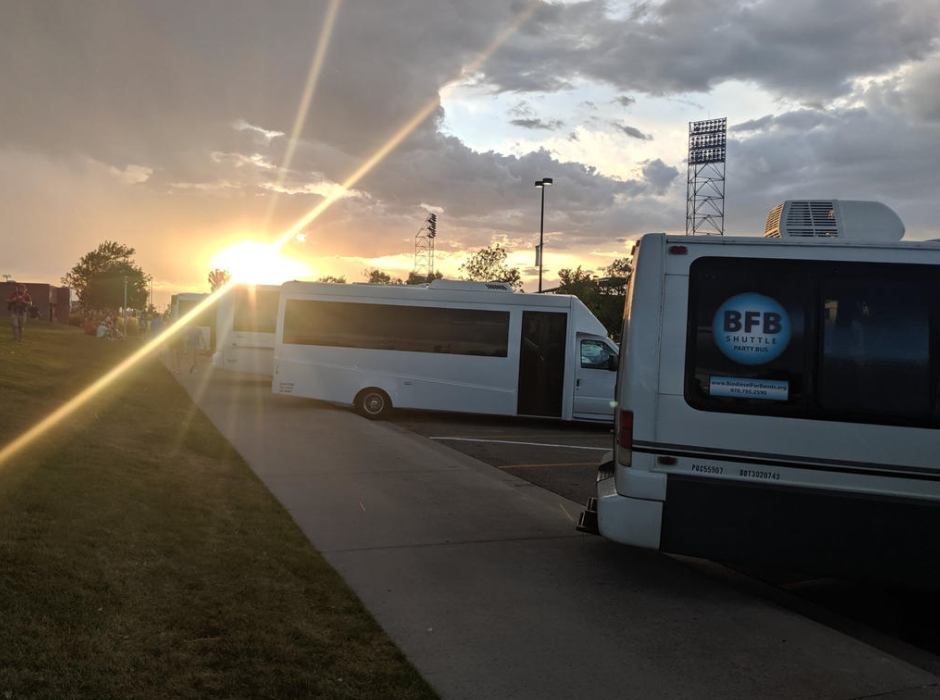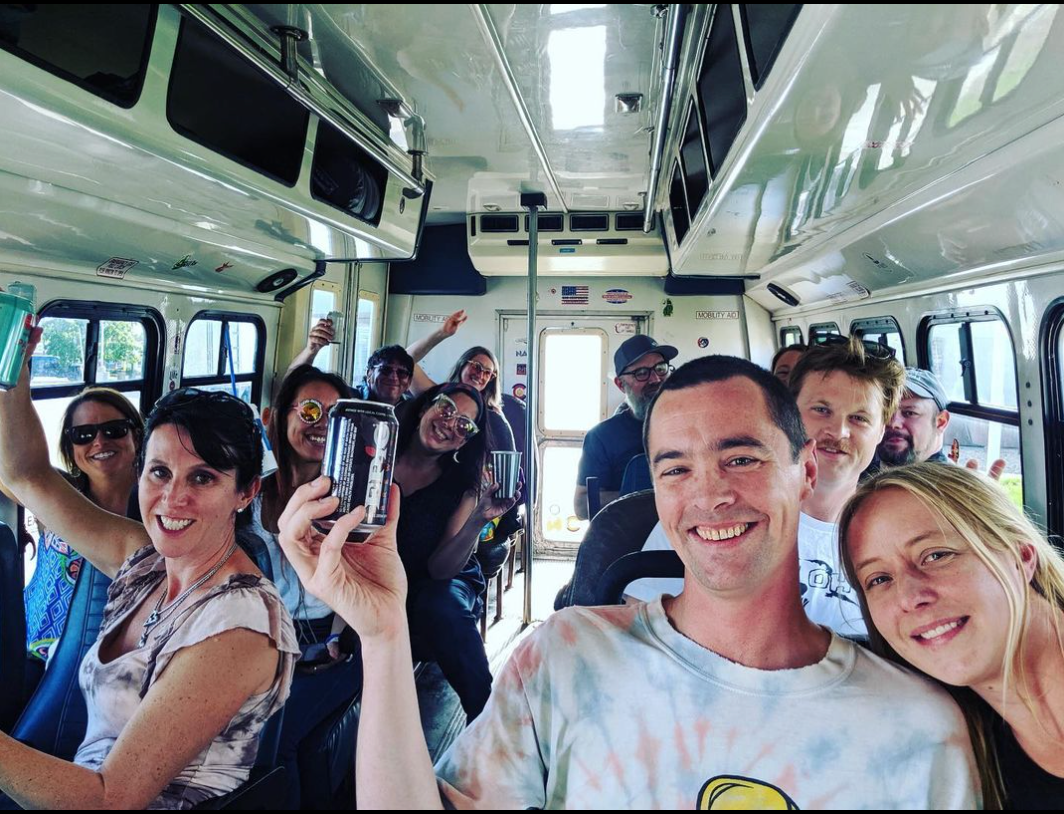Eric Skjerseth: Owner of Planetary Transport Company teaches us about biodiesel
Eric Skjerseth is the Owner of Planetary Transport Company based in Colorado. The first carbon neutral transportation company in America. Bringing fans to bands, and bands to fans, sustainably. Read on to learn about biodiesel, and how it can be used to power the music and events industry.
Hi Eric, our readers would love to learn more about how biodiesel can be used to power events, generators, and transportation. Can you help us understand biodiesel better?
Biodiesel is a manufactured product made from either used, or virgin vegetable oil, or animal fat. There's been a “do it yourself” movement for years of people modifying diesel engines to use straight vegetable oil, which you can take straight out of a fryer from a restaurant, filter it, and put it into a modified diesel engine. That's SVO, or straight vegetable oil. Now, that’s not what we use in our vehicles. Most often, we use manufactured biodiesel, which can go straight into any diesel vehicle with no modifications.
Biodiesel can be blended and used in many different concentrations. The most common are B5 (up to 5% biodiesel) and B20 (6% to 20% biodiesel). B100 is pure biodiesel. Almost all of the diesel you buy at a gas station, depending on what state you're in, probably has some biodiesel in it. Like Minnesota has B20 through the warmer months of April through October, and B5 the rest of the year. So by default, you're using biodiesel in Minnesota if you drive a diesel vehicle. For all diesel engines, B20 is considered safe, and won’t void your engine warranty. B20 is also what the EPA considers an “alternative fuel.”
As far as using it in generators and light towers, and things like that for events, B20 is safe and effective. Because of increased lubricity, it's actually better for your engine life. I can say that we’ve fueled entire music festivals on B100. But we often keep it at B20, which is what is recommended by the engine manufacturers. I’ll explain more later about how B100 could be used more often. But, by using B20, you’re still reducing your petroleum usage by 20%.
Biodiesel exhaust has between 78% to 82% less carbon output. And biodiesel exhaust has 50% less particulates that cause asthma, and 99% less carcinogens. Also, last time I checked, in Colorado B20 is 33 cents per gallon cheaper than regular petroleum. So you're saving money, you're reducing your petroleum usage, and you're putting less carcinogens in the air at your event. Just to clarify, carbon in the air is what affects climate change. But for your patrons, the people at the festival, and the event staff, air quality (particulates) is also an issue. Running a generator is basically like a Mack truck sitting with the pedal to the floor. People are around those generators for three days straight, and breathing in that exhaust, those carcinogens.
We've done a few festivals where we showed up onsite, and the generators and light towers were already running 100% petroleum diesel, which we emptied into barrels, and refilled them with B100. And one of the bar staff, who had a generator right outside her tent, said, “My headache went away. I've been here getting ready for two days, and I've had a headache (from the petroleum generator exhaust) for the last two days. And whatever you guys did yesterday, I haven't had that headache today.”
And that was one of the moments where we became aware that this is not just about climate change, it's important for the health of the attendees, and the employees. If you're in the food court, or a large food festival, there's probably a generator right in the middle. The generators have huge tanks, and it takes five to eight minutes to fill them. And while you're standing there, breathing in that diesel exhaust, you start to feel it. But when you start putting in the B100, the exhaust is just so much more pleasant, for your senses and your overall health. Like I said, there's 99% less carcinogens, and less particulates, so it's better for everybody who’s onsite at a festival or at an event.
My goal is to have a fleet of generators that can go from festival to festival and run on B100. And eventually take it nationwide. There's no need to use petroleum in the generators.
Can using B100 damage generators? What needs to happen so that the event industry can use exclusively B100, and have no issues?
One issue with B100 is that it gels at a much higher temperature than petroleum. So if you're in a cold weather event, like Winter Wondergrass in Tahoe or Steamboat, the generator needs some kind of electric heater when the generator gets shut down. I’m talking about scenarios when it’s below about 14 degrees outside. You’d need something with a battery back-up in that type of scenario.
But the main issue is that biodiesel is basically a detergent. And petroleum is a dirty fuel. So if you've been running petroleum in your generators, the fuel lines and tank have this grease on the inside of them. And when the biodiesel goes in, it completely cleans out the tank and the fuel lines. When the fuel lines get cleaned out, it clogs the fuel filter, and this will shut the generator down.
So if you buy a brand new generator, and you've never run diesel in it, there's really no problem. If you're running it in warm weather events, it will run on B100 just fine.
And those are the two things people need to know: if you're going to be operating in really cold weather, you're going to need some kind of way to keep the fuel tank warm before you start it up. And that can be just like a couple extra batteries and a heated gas tank on a generator. Or, you can also just drop the blend down, you know, until you get the generator going.
So, put a small amount of B20 in there just to get it heated up. Right? And then you could fill the rest of the tank up with B100?
Yes.
That sounds pretty easy.
And let’s talk about generators and light towers that you would use at an event, or concert or festival. You want to make sure that you're not running B100 through an engine like that has been running diesel for its whole life. But if you want to make the switch, it's pretty simple. You just put the B100 in and run it, then change the fuel filter. You might have to do that a couple of times, but then it will be as good as new.
So, I’m hearing that it’s relatively easy to flip older generators over to running on B100.
Yes, very doable.
The positive comments we've got at the festivals where we ran B100 have been so great. I spent a lot of time contacting every major generator rental company, and saying this is something that’s important to their clients. My advice to event producers is if you are renting generators, make sure to tell them that B100 is something you want and B20 is an acceptable alternative.
Have you gotten any pushback from festival producers about using biodiesel?
I've worked on some festivals where we were told this was their first year, and they didn’t want to take any chances. I've had event producers say you can run biodiesel in any of the generators, except for the mainstage generators, because they’re not taking any risks with the headliner going down.
Is the risk of using biodiesel legitimate? Or is this just in people’s heads? Because generators can go down even if they are powered on pure petroleum.
It’s in people's heads. We did a festival in southern Colorado and a generator went down that was powering a small stage for a DJ set. Immediately, the biodiesel was blamed. But what happened was, we had run out of biodiesel, and we had filled it with red diesel (note: red diesel is a fuel that is used for machinery and off-road vehicles across a wide variety of industries including farming and construction. This product is just like regular diesel, but is dyed). We went back to the gas station where we bought it, and they're like, “That red diesel is actually kind of old, it’s been sitting in that tank for a long time. So you might want to run it through a filter.” And I was like, “Oh, we wish you had told us that before!” Of course we always bring our fuel from our own vendor, and this one time we were in a remote area, and we just ran out.
In general, people are afraid of doing something new. I’ve been told some version of this by festival producers and concert promoters, “The music industry runs on diesel fuel and that is never going to change.” I always explain that we can reduce their carbon footprint by 20% with no added costs, just by using B20. And you can find B20 all around the country.
Furthermore, you can do a B100 tour. You’ll have to do a little searching for the B100. And you might have to supplement some petroleum diesel in between Denver and Las Vegas to get to California, for example. But, we’ve helped several bands do biodiesel tours.
Co-Founder John R Long filling up one of their busses with B100
And that's what we're working on as a company. What restaurants produce in fryers is enough to power and fuel the entire music industry, like four times over. And luckily, the way it works out, most of the places where concerts and large music gatherings happen are in cities with tons of restaurants. So it just makes sense that we go into these cities, recycle all of the restaurant grease into biodiesel, and use it to fuel the music industry. And when I say the music industry, I mean the touring entertainment industry, like theater groups, dancers, and stand up comedians. The restaurant industry could power all those tours and we as an industry could kick our petroleum habit.
So, you mean biodiesel can be used to fuel the tour buses, and other vehicles used to move gear and staging?
Yes, all those semis and tour buses run on diesel.
And most of the festivals take place in the warmer months anyway.
Yes. I brought up Winter Wondergrass, and that's less than 1% of the music festivals.
My hope is that all of the event producers who read this ask for B20 to be used in their generators and light towers when they make their rental orders. And then ultimately say, “We would love to rent from you again if we could have B100 in these the next time.”
But even if you're renting a generator for a job site, like for a construction project, your workers are working around that. And it’s basically like that car standing around a car with the fuel with the pedal to the floor. So, this goes for every industry, of course.
I understand there is so much risk involved in producing a festival, and the way you’ve always done it seems less risky. But we've done it for festivals where we’ve run the entire event on B100. And by doing this, we’ve kept about 200 tons of carbon out of the air.
What are the next steps for you?
I would love to consult with some of the generator companies, and help them convert their generators to B100. I also want to consult with a festival producer and say, “Hey, we can make this happen.”
My goal is to get funding, and build a fleet of vehicles and generators that are fossil fuel free.
Now that festivals are coming back, and if anybody has any questions, they can definitely reach out to me. (Reach out to Eric HERE)
Why start with the music industry?
Artists have always led the way towards change in everything. And we need the music industry, the artists, and the entertainment industry to step up and say “We don't want to use petroleum anymore. We don't want to destroy the Earth.”
Truer words never spoken. It’s always been the musicians and the artists who have been among the first to embrace change and culture shifts. Many people think we're “just” events, and “what kind of real change can we make?” But you’ve just made a really good point. The music and event industry can (and should) be changemakers.
We started our company in 2012 with a goal of changing the way the music industry fuels itself. Biodiesel is by far the most feasible alternative fuel, because you're using the existing infrastructure. I'm hoping that the battery technology comes around to where it's not running on rare earth metals. We recently changed our name from “Biodiesel for Bands” to “Planetary Transport Company” to incorporate all aspects of sustainable touring and sustainable transport.
One of the definitions of planetary is “of or for the planet.” We strive for every decision we make to be the best for the planet. So, B20 right now is the best I can do for the planet. But my goal is that by next summer, all my buses will be running on B100. There is also a place for electric vehicles right now, and specifically, there are companies that make electric diesel hybrids. They have a backup generator onboard that runs on diesel fuel. This backup generator can power the electric vehicle if it runs out of batteries. I would love to put some of those on the road.
California, for example, has this mandate of zero emission vehicles by 2035. But in reality there are lot of emissions that go into the battery, which makes biodiesel better than anything else for the environment.
Plus, a lot of bands have these beautiful tour buses that are like houses on wheels that are awesome. They also run on diesel fuel. I don’t think we should just scrap those when they have many years of life left, and all it would take is about $1,500 of modifications to let them run on to be B100 all year round, like everywhere they go. That's more environmentally friendly than building an electric bus. As it stands right now, the electric vehicles that we’ve seen don’t work for the demands of the music industry. The battery technology isn't there yet. For state and federal officials to make all these infrastructure changes to pivot to electric, without including biodiesel in their plan, doesn’t make sense for a clean energy future. Biodiesel has to be a part of it.
And farmers need to play a key role in all of it. We need incentives for farmers to grow crops like hemp, the seed oil from hemp would make amazing biodiesel. Farmers could literally grow their own fuel for their tractors. Hemp farmers are still so rare right now but if we could get everyone to start growing it everywhere—hemp needs to be a part of all of this, too. It is so versatile. We could make hempcrete for buildings, use it for biodiesel from the hemp seed oil, well we could power the entire trucking and building industries ...way more than the music industry. But this is something way, way up, way ahead of my plan! I just know that hemp and biodiesel need to be part of the conversation.
I’m on board with you, Eric!
Website: www.planetarypartybus.com
Instagram: www.instagram.com/planetarytransportcompany
Twitter: www.twitter.com/BiodieselBands
Facebook: https://www.facebook.com/PlanetaryTransportCompany
STAMP (Sustainable Touring Artists, Musicians and Performers): www.STAMPUS.org
More about biodiesel from the US Department of Energy: http://afdc.energy.gov/fuels/biodiesel_blends.html









